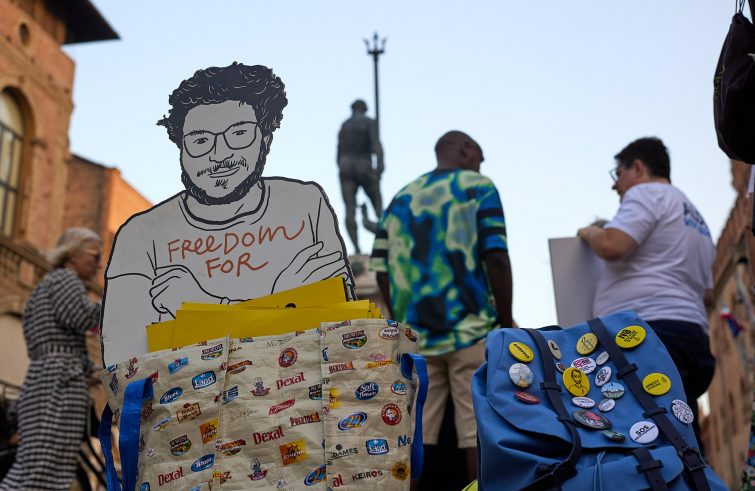
Although Egyptian President Abdel Fattah al-Sisi has pardoned Patrick Zaki and el-Baqer (the lawyer of Egypt’s best-known British political prisoner), “we still cannot claim victory.” The North African country, which has been under the grip of a military regime since 2014, is subject to ongoing human rights violations and deprivation of freedoms. Human rights groups estimate that there are more than 60,000 political prisoners in Egypt, accounting for around 50 per cent of all Egyptian prisoners. More than 4,500 have never been prosecuted and have been detained without trial or sentence. Francesco Vignarca, national coordinator of the Italian Network for Disarmament (which has consistently campaigned for pressure on the regime for justice) and Alessandra Morelli, a former UNHCR official and expert on humanitarian issues, discussed the situation with SIR. To be clear, “we are all pleased with the pardon granted to Patrick Zaki and the fact that he will soon return to Italy,” said Vignarca, “but despite this feeling of relief, we cannot claim victory. This is a regime that decided to stage a senseless prison sentence and trial, and this will not be erased by the final pardon.”
Zaki was tried and sentenced to three years in prison for an article he wrote in 2019 about the inhumane and discriminatory treatment of Coptic Christians:
“Not a month goes by for Christians in Egypt without 8 or 10 painful incidents, ranging from attempts to forcibly displace them in Upper Egypt, to kidnappings, to the closure of a church, to bombings, to the killing of a Christian. The conclusion is always ‘mental disorder’.” The plight of Christians (and all minorities) in Egypt remains extremely critical.
According to Vignarca, “Zaki’s case is in the spotlight because it involves Italy, but there are tens of thousands of political prisoners who are still being held in Egyptian jails and who are not being given the same level of attention. In order to force Al-Sisi and his government to partially reverse course on several issues related to justice and democracy, strong international political pressure is needed, which is currently lacking.”
“We had asked to stop sending arms to Egypt because we thought it was a way to put pressure on individual cases, such as Zaki’s, and also to encourage a change in the political approach,” Vignarca argued.
“This issue is not only about the arms trade. Yet it is crucial,” he stressed.
According to a recent report published by EgyptWide, Italy will export between €18 and €19 million worth of small arms and light weapons to Egypt between 2013 and 2021. “As everyone knows, if you sell arms to a country, you consider it reliable, if not an ally,” Vignarca continued. “Moreover, the European Parliament has adopted several resolutions calling on member states to halt all exports to Egypt of arms, surveillance technology and other security equipment that could facilitate attacks on human rights defenders or activists or other forms of repression, including through social media,” pointed out Giorgio Beretta, a member of the Permanent Observatory on Light Weapons in Brescia.
“I am extremely worried about the policy of alliance with dictators that is currently being pursued both in Italy and in Europe, throughout North Africa, starting with Tunisia and Egypt,” added Alessandra Morelli, who has worked for the UN refugee agency UNHCR for 30 years. “Certainly, after Zaki’s release, we must not lower our guard: a pardon is a symbolic act that leaves thousands of others in prison.”
The decision to ‘pardon’ the former Bologna University student was the result of various pressures, both national and international.
The first reports of the three-year prison sentence handed down by the court yesterday (and subsequently annulled by the pardon granted by President al-Sisi) were followed by a wave of appeals for the release of the activist and former student. The first came from the Egyptian National Dialogue’s Board of Trustees. The latter is a kind of Assembly for Dialogue on domestic affairs, made up of journalists, activists, teachers and students, established within the Egyptian state institutions to promote a supposed openness to dialogue on issues of general interest. The National Dialogue Committee called for the verdict against Zaki to be reconsidered. In a communiqué, it appealed to Egyptian President El-Sisi “to use his legal and constitutional authority to immediately release human rights activist Patrick George Zaki”.
The members of the National Dialogue reminded the president that the student’s recent attainment of a Master’s degree (from the University of Bologna) is evidence of “his commitment to the future of Egypt”. A separate appeal signed by some fifty Egyptian civil society organisations called on Al-Sisi “not to ratify the verdict” but to reject it outright. Signatories included the Cairo Institute for Human Rights Studies (CIHRS), the Campaign Against Arms Trade, Amnesty International and Democracy in the Arab World Now (DAWN).











